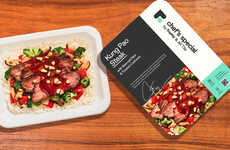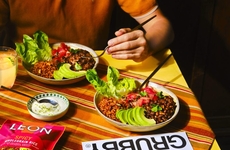
Marley Spoon Teamed Up with Chef Shivi Ramoutar to Create New Recipes
Katherine Pendrill — August 18, 2016 — Lifestyle
References: blog.marleyspoon & foodbev
The recipe box subscription service Marley Spoon recently teamed up with chef Shivi Ramoutar to create a line of limited-edition recipes that help consumers get creative with their meals. With the overwhelming number of meal subscription services now in operation, this partnership is designed to help Marley Spoon stand out from its competitors.
For its Autumn lineup, Marley Spoon partnered with Ramoutar to develop a collection of specialty recipes. Ramoutar specializes in Caribbean food, meaning her recipes largely focus on dishes that families can cook together and not just eat together. Her new recipes will also revolve around seasonal ingredients such as corn, butternut squash and sea bream. The result is fun and flavorful dishes that add a touch of spice to Marley Spoon's recipe boxes.
For its Autumn lineup, Marley Spoon partnered with Ramoutar to develop a collection of specialty recipes. Ramoutar specializes in Caribbean food, meaning her recipes largely focus on dishes that families can cook together and not just eat together. Her new recipes will also revolve around seasonal ingredients such as corn, butternut squash and sea bream. The result is fun and flavorful dishes that add a touch of spice to Marley Spoon's recipe boxes.
Trend Themes
1. Specialty Recipe Partnerships - Collaborating with chefs to create limited-edition recipes can differentiate recipe box subscription services.
2. Cultural Cuisine Emphasis - Highlighting recipes from specific culinary traditions can attract customers looking for unique flavors and experiences.
3. Seasonal Ingredient Focus - Incorporating seasonal ingredients into recipe box offerings can provide customers with fresh and timely meal options.
Industry Implications
1. Food Delivery and Subscription Services - Integrating chef-driven recipe partnerships can disrupt the recipe box market and attract more customers.
2. Culinary Education and Food Tourism - Promoting cultural cuisine emphasis can create opportunities for culinary education and food tourism experiences.
3. Agriculture and Farming - Participating in the seasonal ingredient focus trend can drive demand for specific agricultural products and farming practices.
0.6
Score
Popularity
Activity
Freshness























